Related Research Articles

Sir Anthony Hope Hawkins, better known as Anthony Hope, was a British novelist and playwright. He was a prolific writer, especially of adventure novels but he is remembered predominantly for only two books: The Prisoner of Zenda (1894) and its sequel Rupert of Hentzau (1898).

Ralph Bates was an English film and television actor, known for his role in the British sitcom Dear John and the 1975 series Poldark.

Earl of Oxford and Asquith is a title in the Peerage of the United Kingdom. It was created in 1925 for the Liberal politician H. H. Asquith. He was Home Secretary from 1892 to 1895, Chancellor of the Exchequer from 1905 to 1908, Leader of the Liberal Party from 1908 to 1926 and Prime Minister of the United Kingdom from 1908 to 1916. Asquith was made Viscount Asquith, of Morley in the West Riding of the County of York, at the same time, also in the Peerage of the United Kingdom. This title is used as a courtesy title by the heir apparent to the earldom.

Anthony Asquith was an English film director. He collaborated successfully with playwright Terence Rattigan on The Winslow Boy (1948) and The Browning Version (1951), among other adaptations. His other notable films include Pygmalion (1938), French Without Tears (1940), The Way to the Stars (1945) and a 1952 adaptation of Oscar Wilde's The Importance of Being Earnest.
David Markham was an English stage and film actor for over forty years.
Piers Paul Read FRSL is a British novelist, historian and biographer. He was first noted in 1974 for a book of reportage, Alive: The Story of the Andes Survivors, later adapted as a feature film and a documentary. Read was educated at St. John's College, Cambridge, where he studied history.

The Winslow Boy is a 1948 British drama film adaptation of Terence Rattigan's 1946 play The Winslow Boy. It was made by De Grunwald Productions and distributed by the British Lion Film Corporation. It was directed by Anthony Asquith and produced by Anatole de Grunwald with Teddy Baird as associate producer. The adapted screenplay was written by de Grunwald and Rattigan based on Rattigan's play. The music score was by William Alwyn and the cinematography by Freddie Young.
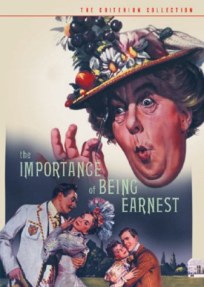
The Importance of Being Earnest is a 1952 British comedy drama film adaptation of the 1895 play by Oscar Wilde. It was directed by Anthony Asquith, who also adapted the screenplay, and was produced by Anthony Asquith, Teddy Baird, and Earl St. John.
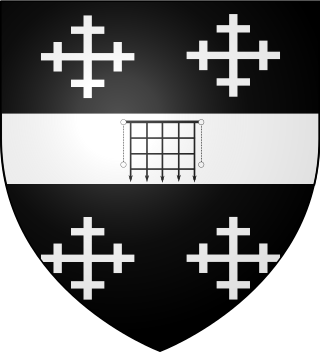
The Asquiths were originally a middle-class family from the West Riding of Yorkshire, England. They were members of the Congregational church, whose family name derived from the village of Askwith. The first prominent member of the family was H. H. Asquith, who was prime minister from 1908 to 1916. In 1925, Asquith was raised to the peerage as Earl of Oxford and Asquith. His great-grandson Raymond is the present Earl.

The Scapegoat is a 1959 British mystery film directed by Robert Hamer and starring Alec Guinness, Nicole Maurey and Bette Davis. The screenplay was by Hamer and Gore Vidal based on the 1957 novel of the same name by Daphne du Maurier.

Cottage to Let is a 1941 British spy thriller film directed by Anthony Asquith starring Leslie Banks, Alastair Sim and John Mills. Filmed during the Second World War and set in Scotland during the war, its plot concerns Nazi spies trying to kidnap an inventor.

Fanny by Gaslight is a 1944 British drama film, directed by Anthony Asquith and produced by Gainsborough Pictures, set in the 1870s and adapted from a 1940 novel by Michael Sadleir.

Orders to Kill is a 1958 British wartime drama film directed by Anthony Asquith and starring Paul Massie, Eddie Albert and Irene Worth. It was written by Paul Dehn and George St. George based on a story by Donald Chase Downes, a former American intelligence operative who also acted as technical adviser to the film.

The Final Test is a 1953 British sports film written by Terence Rattigan, directed by Anthony Asquith, and starring Jack Warner, Robert Morley, George Relph and Ray Jackson. A number of leading cricketers also appear including Denis Compton, Len Hutton and Cyril Washbrook. The film was produced by R.J. Minney for Act Films Ltd. It was that company's second film.
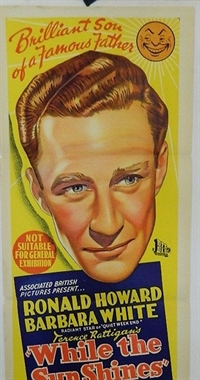
While the Sun Shines is a 1947 British comedy film directed by Anthony Asquith and starring Barbara White, Ronald Squire, Brenda Bruce, Bonar Colleano, and Michael Allan. It was based on Terence Rattigan's 1943 play of the same name.

The Young Lovers is a 1954 British Cold War romantic drama film directed by Anthony Asquith and starring Odile Versois and David Knight. The film was produced by Anthony Havelock-Allan, with cinematography from Jack Asher and screenplay by George Tabori and Robin Estridge. It was shot at Pinewood Studios with sets designed by the art directors John Box and John Howell. At the 1955 British Film Academy Awards, The Young Lovers picked up the prizes for Best Screenplay and Most Promising Newcomer to Film.

Two Living, One Dead is a 1961 British-Swedish existentialist thriller film directed by Anthony Asquith and starring Patrick McGoohan, Virginia McKenna and Bill Travers. It was written by Asquith and Lindsay Galloway.
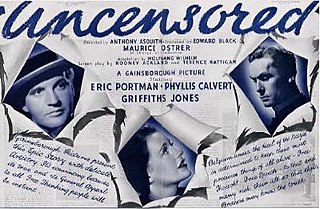
Uncensored is a 1942 British war drama film directed by Anthony Asquith starring Eric Portman, Phyllis Calvert and Griffith Jones. The film was produced at Gainsborough Pictures by Edward Black, with cinematography from Arthur Crabtree and screenplay by Rodney Ackland, Wolfgang Wilhelm and Terence Rattigan based on the 1937 novel of the same title by Oscar Millard. The film was shot at the company's Lime Grove Studios in Shepherd's Bush, with sets designed by the art director Alex Vetchinsky.
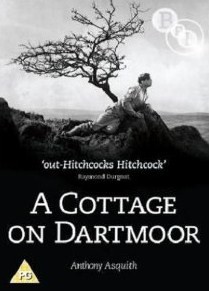
A Cottage on Dartmoor is a 1929 British part-talkie sound film, directed by Anthony Asquith and starring Norah Baring, Uno Henning and Hans Adalbert Schlettow. The cameraman was Stanley Rodwell. In addition to a sequence with audible dialogue or a talking sequence, the film also featured a synchronized musical score with sound effects and English intertitles. The soundtrack was recorded using the Klangfilm Tobis sound recording process. A cut down edited silent version was made for theatres that had not yet converted to sound but this version is no longer extant.

Rush Hour is a 1941 British Public Information short film made by the wartime Ministry of Information and designed to pass on an important message to cinemagoers in a humorous manner. The film was directed by Anthony Asquith and produced by Edward Black.
References
- ↑ Ryall, Tom (2011). Anthony Asquith. Oxford University Press. ISBN 9781847794345 . Retrieved 19 January 2016.
- ↑ Two Fathers at BritMovie (archived)